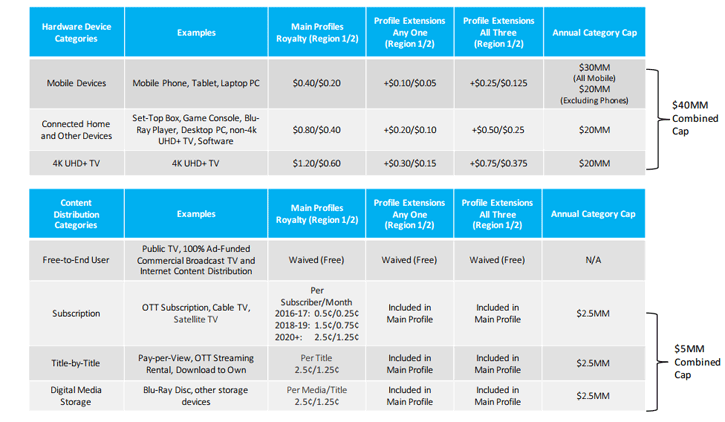If you are wondering why the very good hevc-videcodec is adapting to the market so slowly, it's because the licenses are expensive. Good news, albeit it might be too late such a license is getting cheaper.
High Efficiency Video Coding (HEVC) is a video compression standard, a successor to H.264/MPEG-4 AVC (Advanced Video Coding). HEVC is protected by patents owned by various parties. Commercial use of HEVC technologies requires the payment of royalties to licensors of HEVC patents.
On its website the HEVC advance group highlighted the pricing structure for the usage of the hevc-videcodec. Not only prices are being lowered, the suppliers do not have to pay for free online content either. Next to that there is an option to get discounts that run up-to 50% of the license costs. You need to understand that the Netflixes and Amazon Primes for example pay for each and every user. Such video streaming services a are looking at 0.5% every month for every 4K-related subscription. So Netflix would have to pay around $0.06 a month for each subscriber to its $11.99 UHD package, while Amazon would be looking at around $0.50 per annum for its $99-a-year Prime subscribers.
There are caps though. Companies that that only stream content towards mobile devices pay a maximum (cap) of 40 million dollars per year. For say 4k-hdtv that number is 20 million dollars. For companies that want to use both they only needs to pay 60 million a year. Public broadcasters do not pay a thing. HEVC is also called h265, it was the dreamed successor towards h264 and is supposed to be the revelation for Ultra HD video. As this short news items shows, the pricing levels are just insane, and that restricts the adoption of hevc. It might also be a reason why Ulra HD Blu-ray has not launched just yet.
You could call the HEVC advance group another patent group that is trying to cash in as much as they can as even after these price cuts, the license fees are incredible high and thus restricting your Ultra HD experience. Literally the HEVC advance group is slowing down your Ultra HD experience as you'd expect Ultra HD movies by now right ?
This right here is why HEVC is a dying video codec
The alternative is looking into VP9 as it is free and open source, VP10 is almost ready (and free as well) and could pass HEVC in terms of efficiency and quality, also for free. That's probably where the future is. Manufacturers already have started their own alliance (Alliance for Open Media) to bypass restrictive companies like the the HEVC advance group. The Alliance for Open Media is now supported by Microsoft, Google, Mozilla, Cisco, Intel, Netflix and Amazon.


